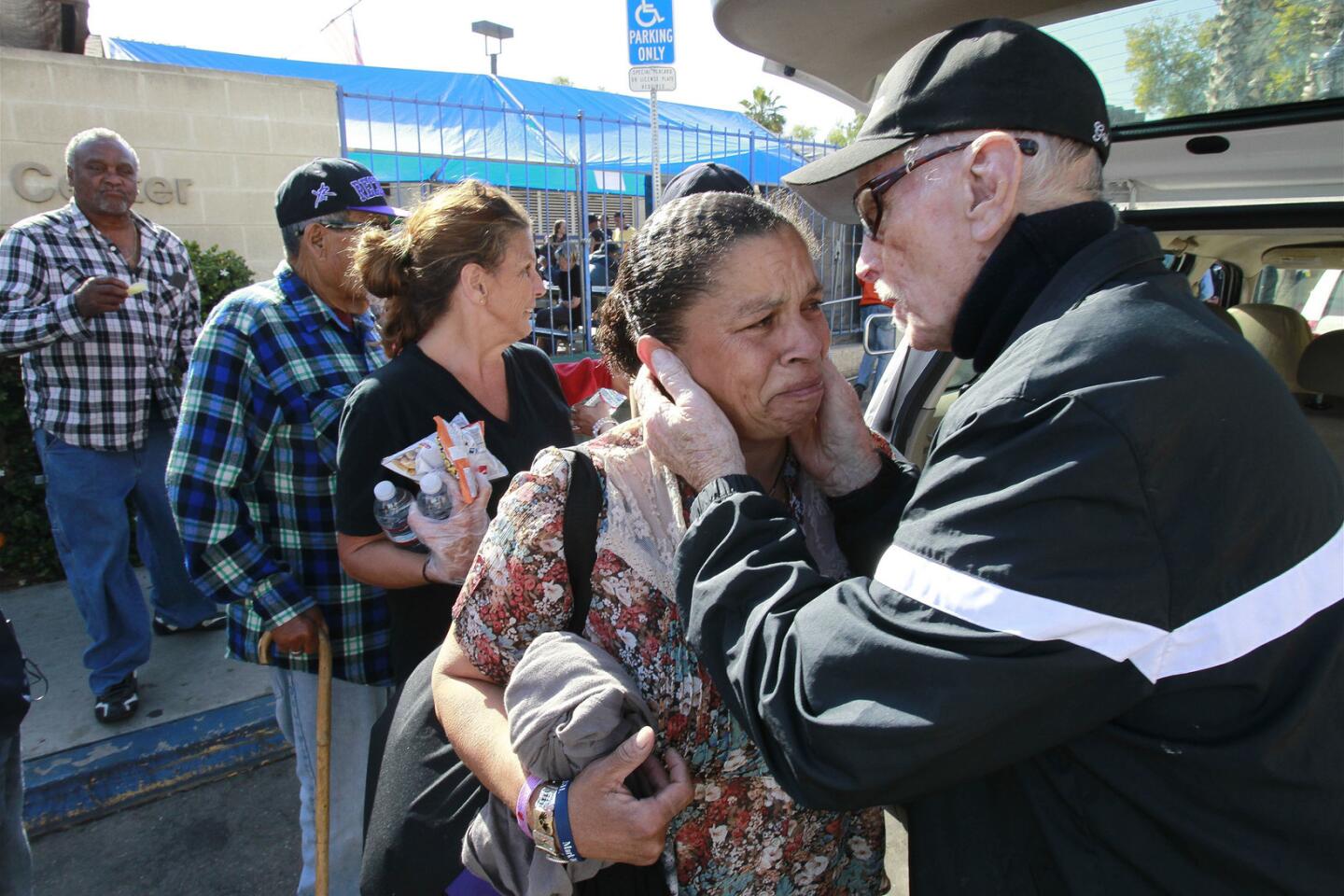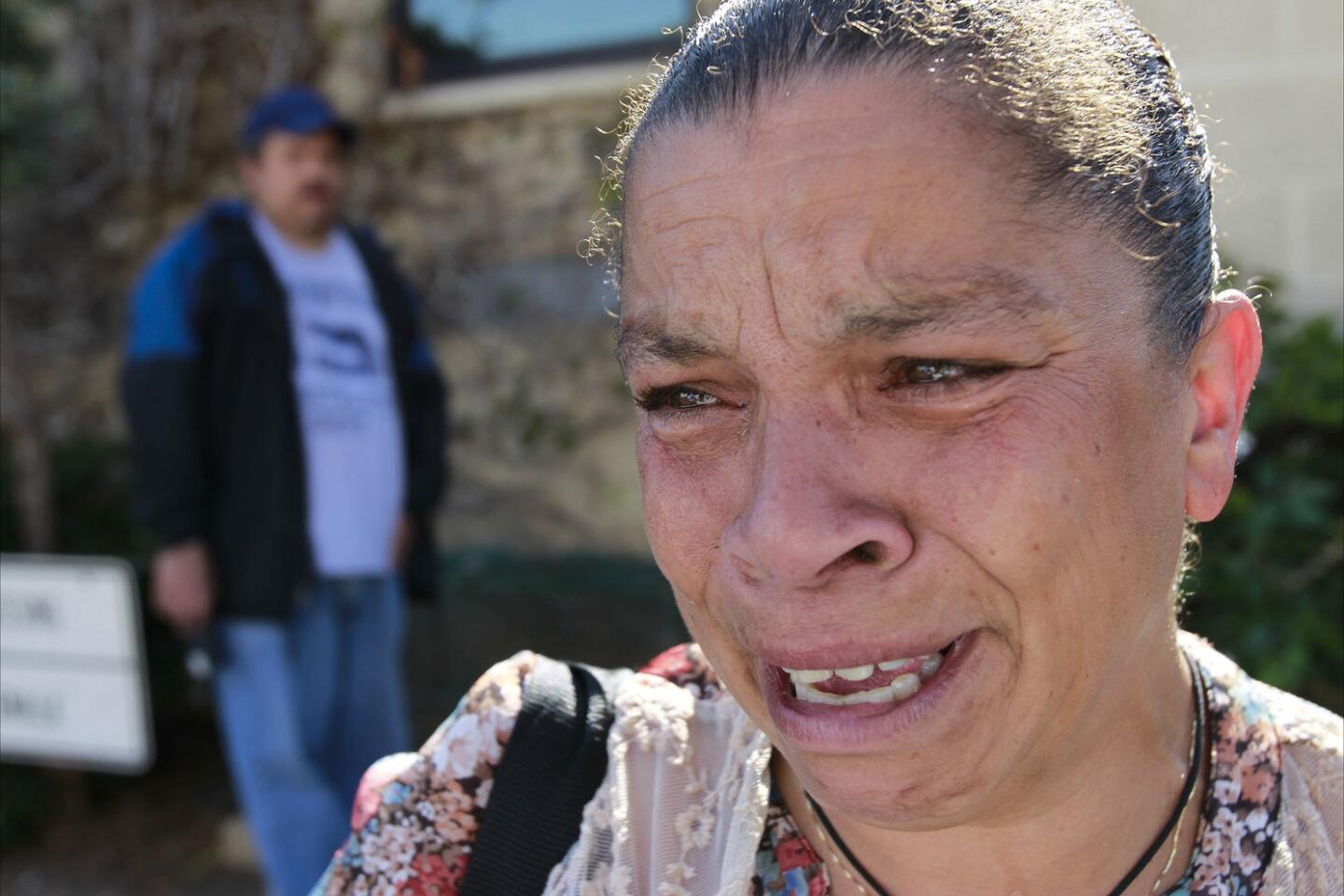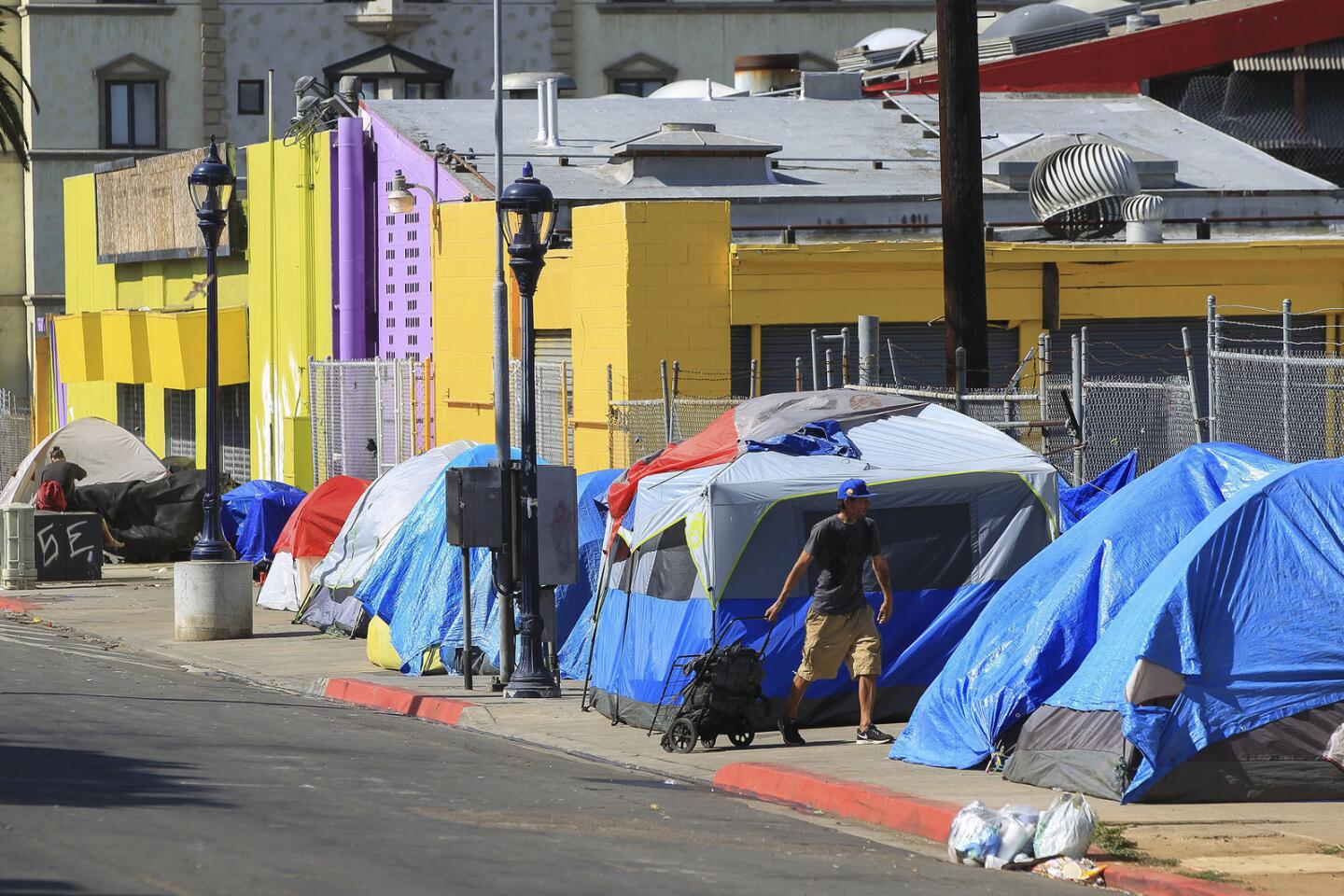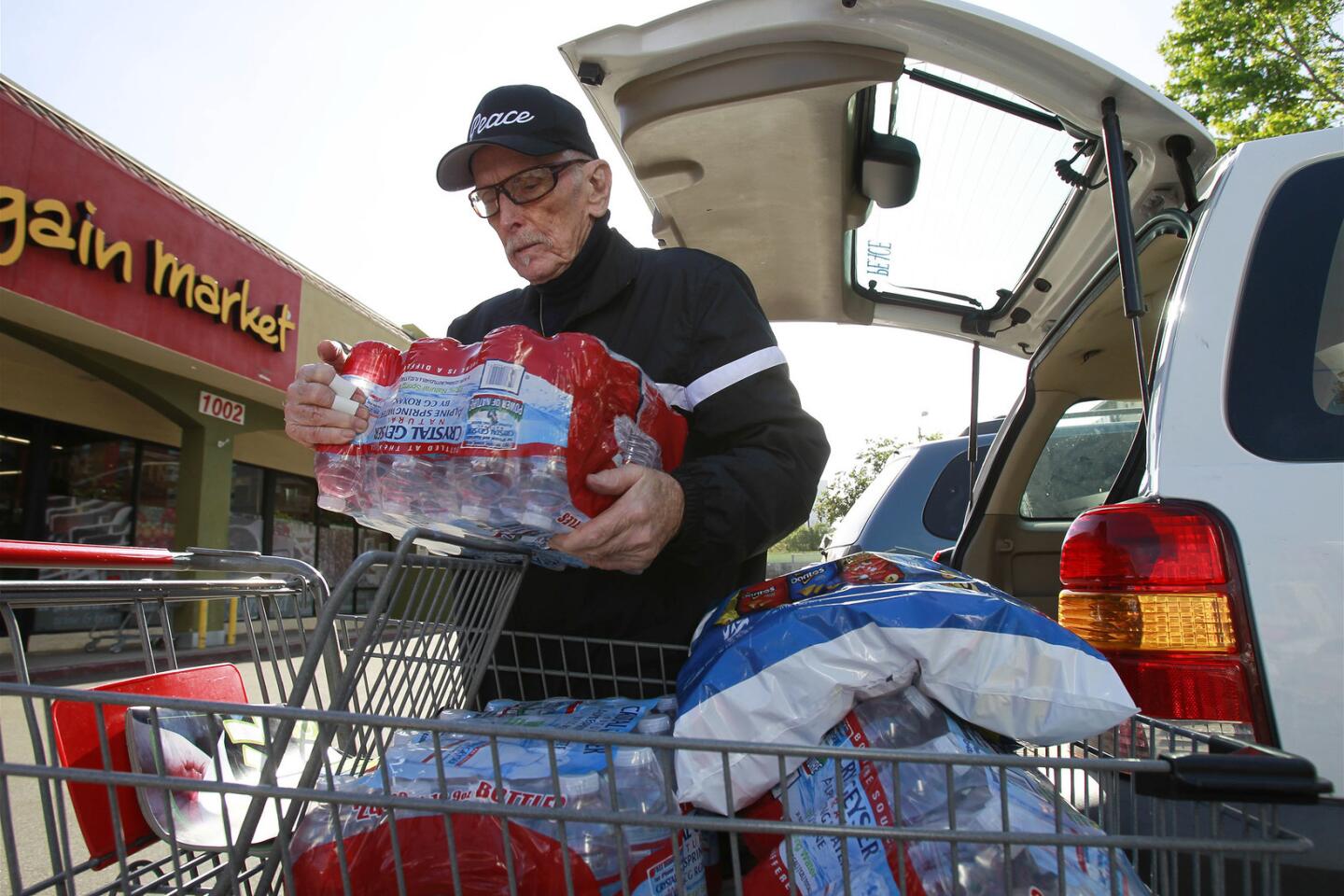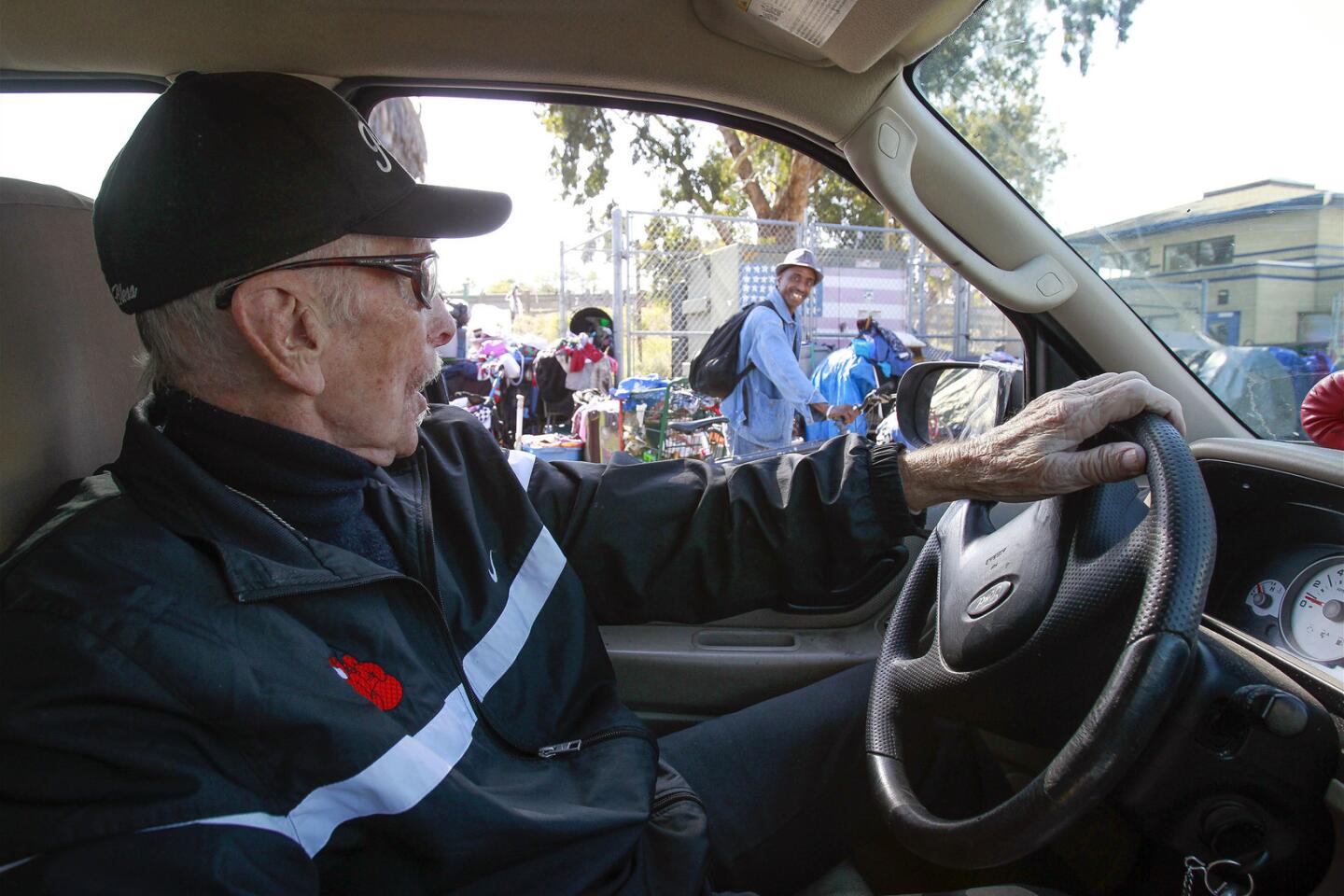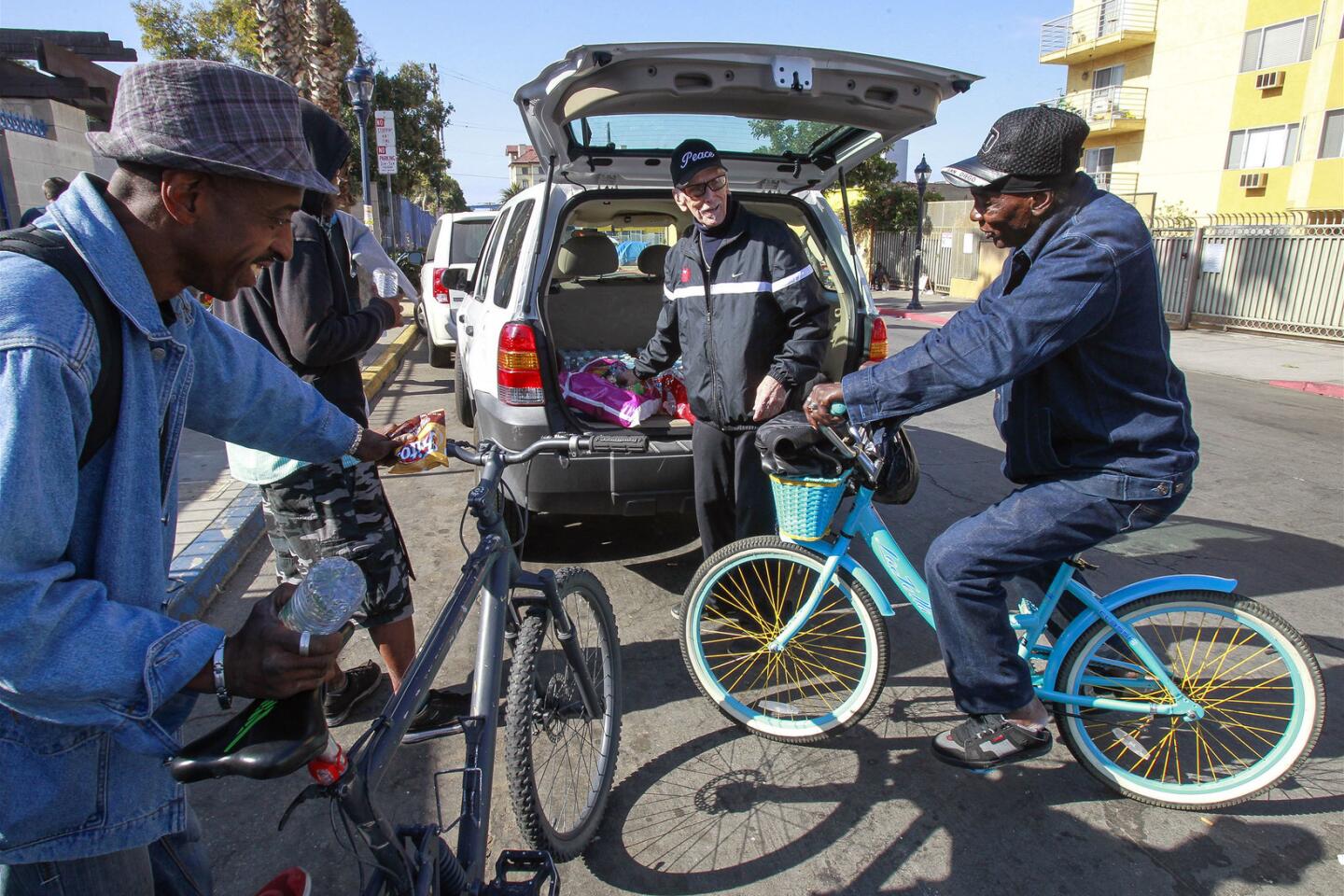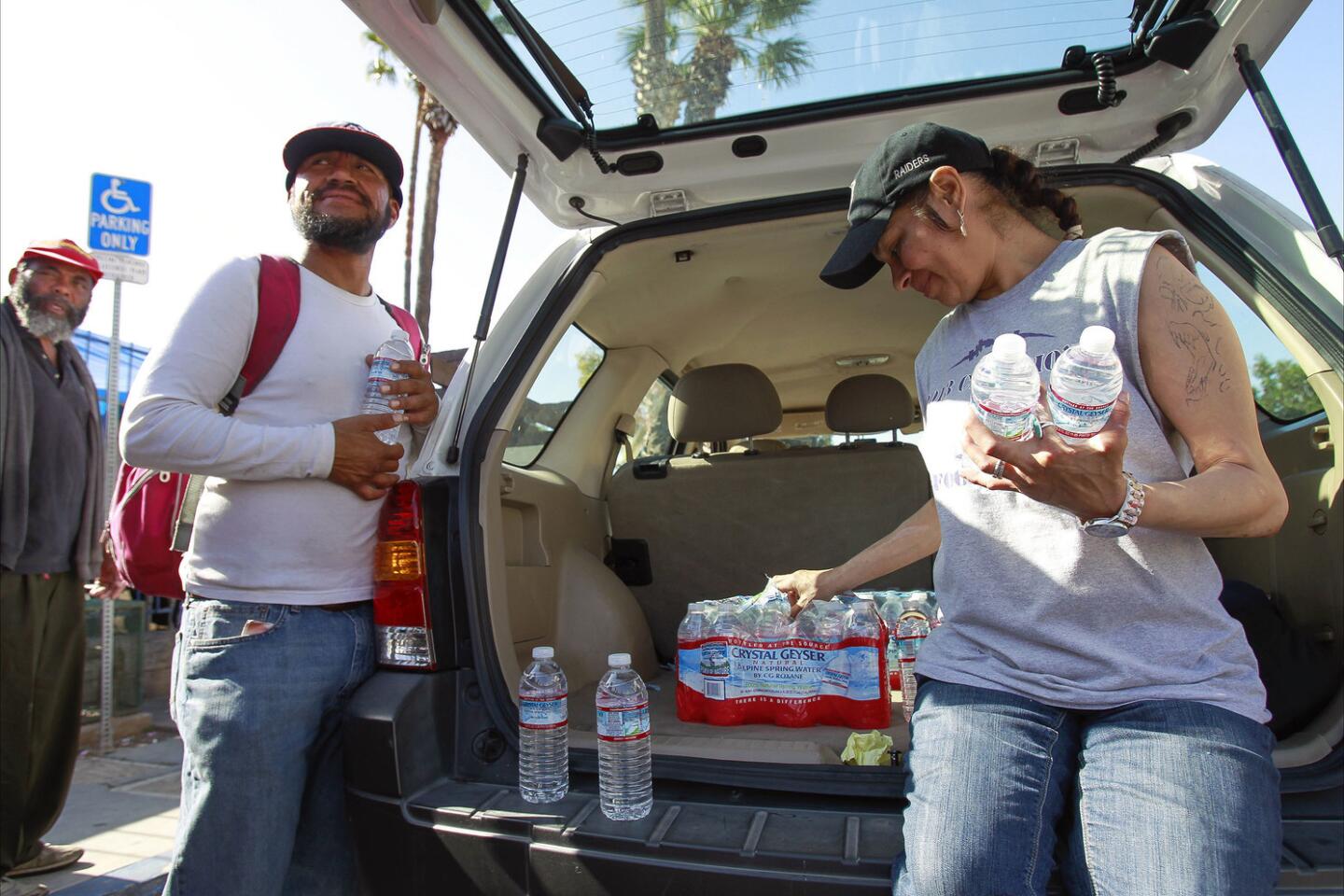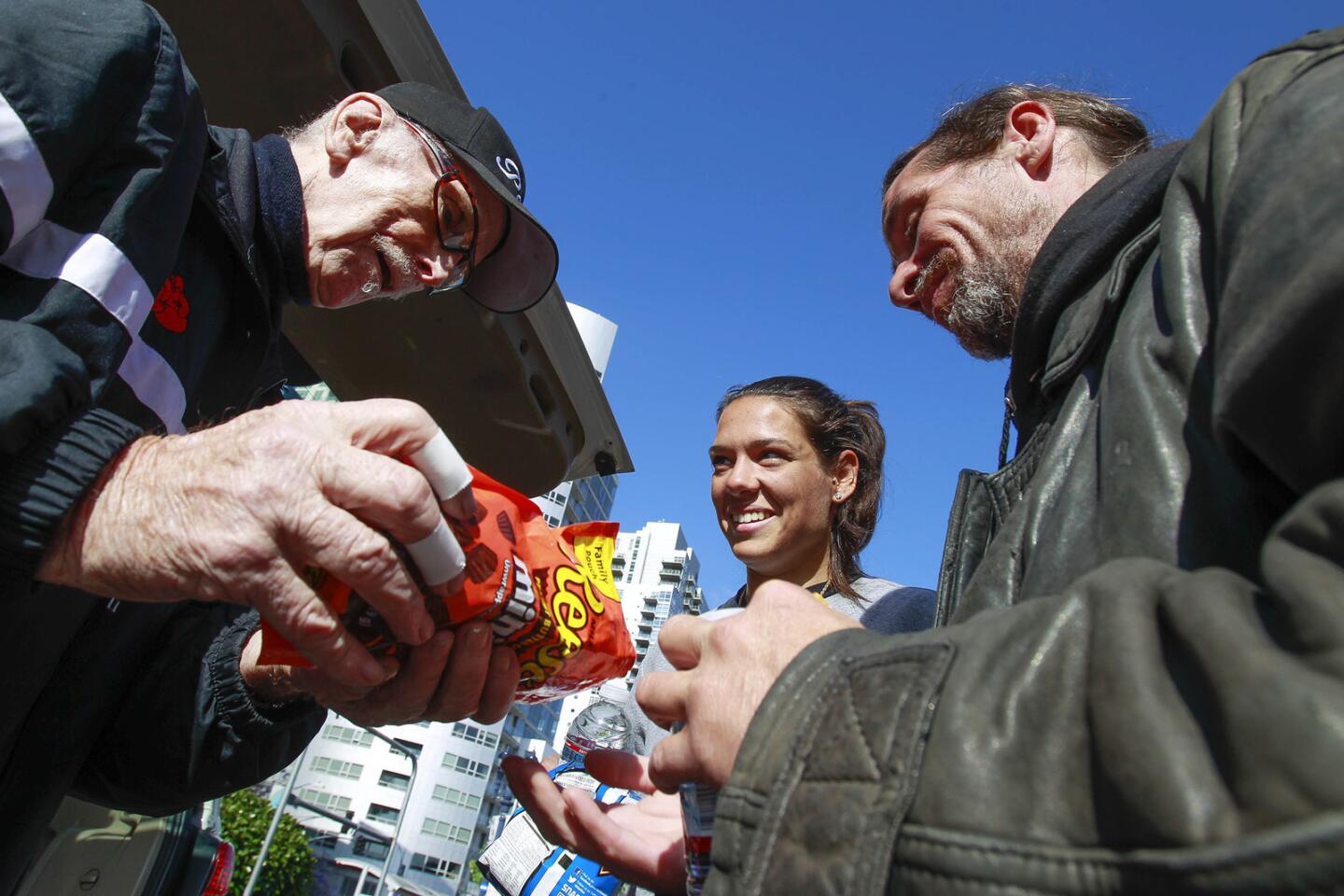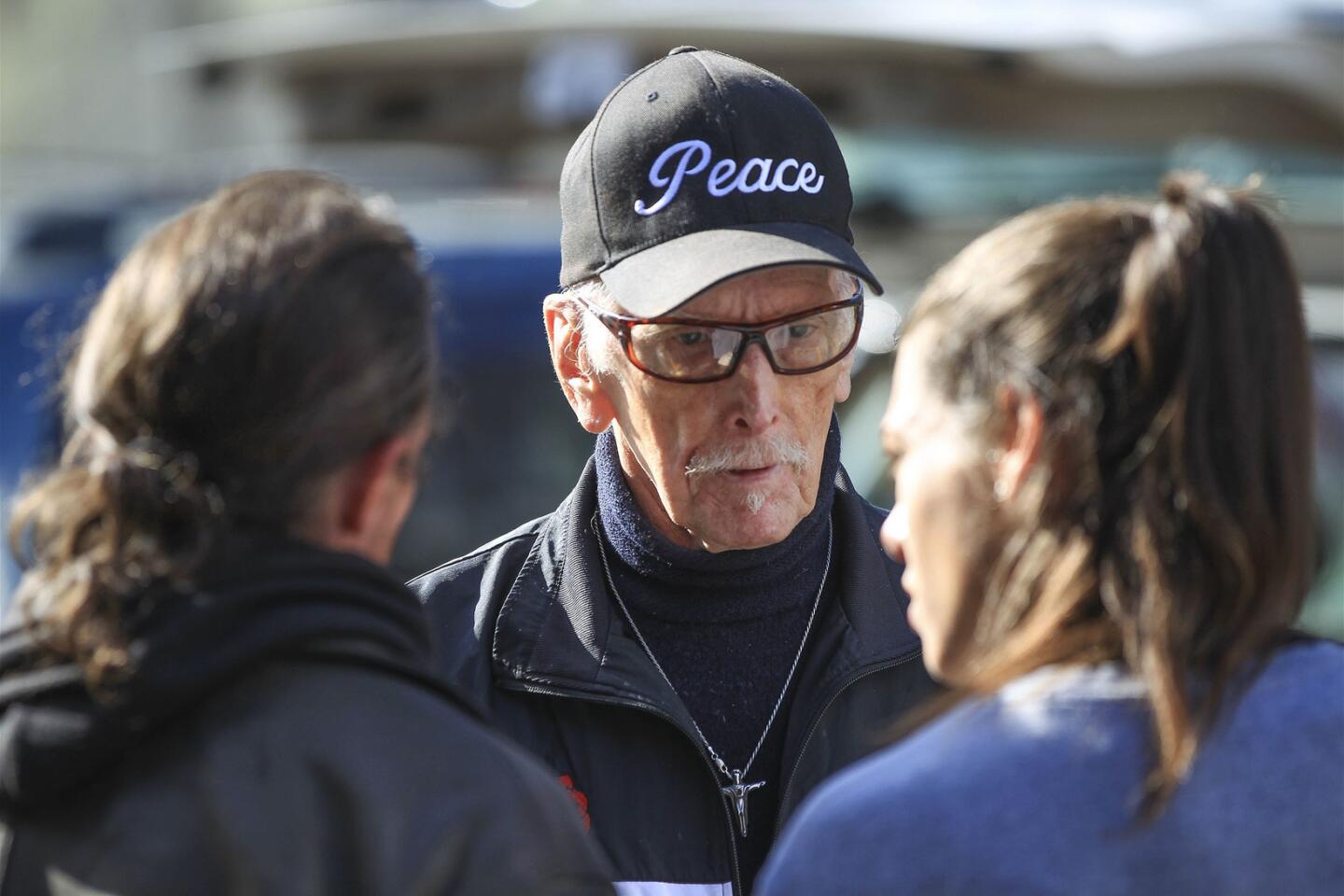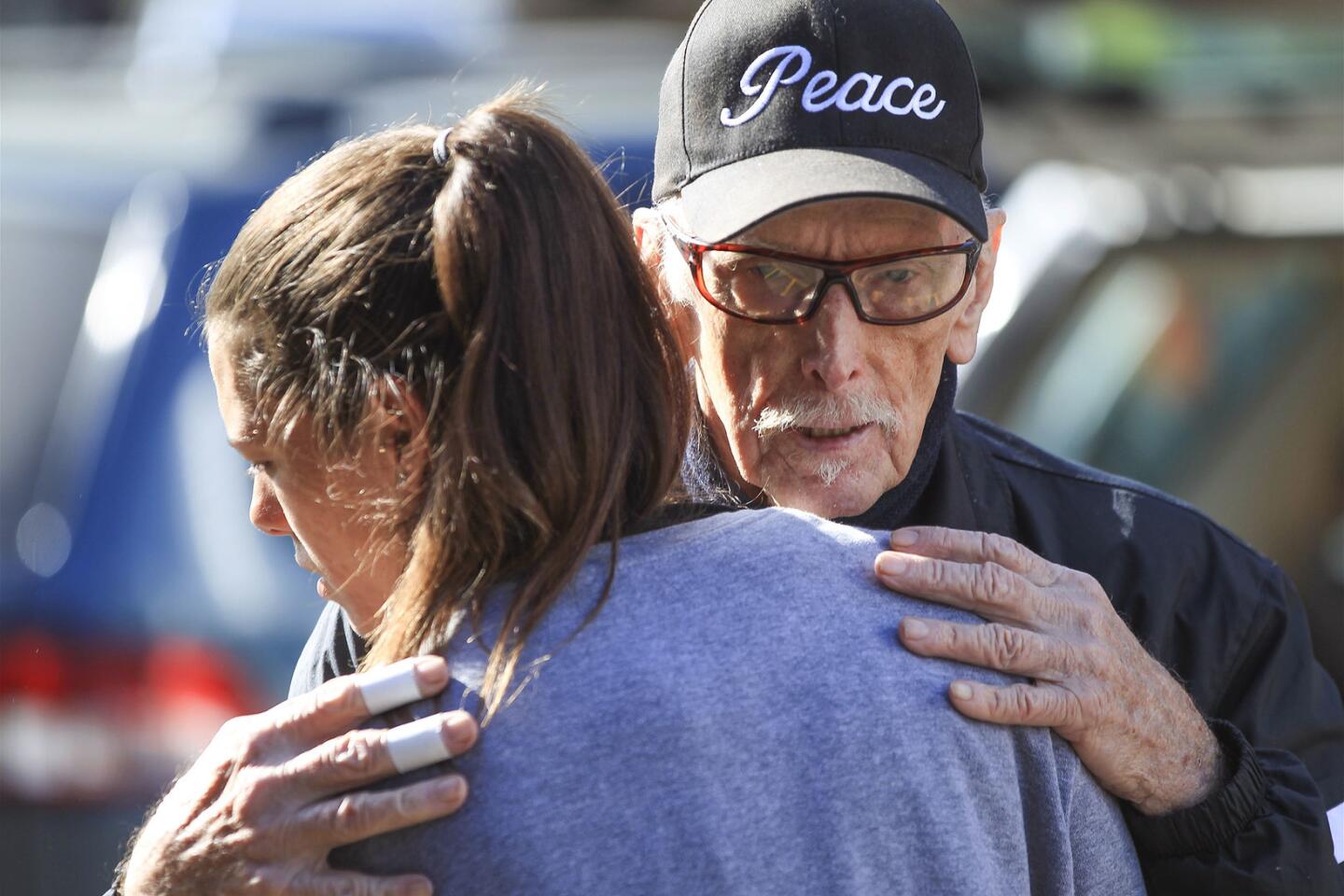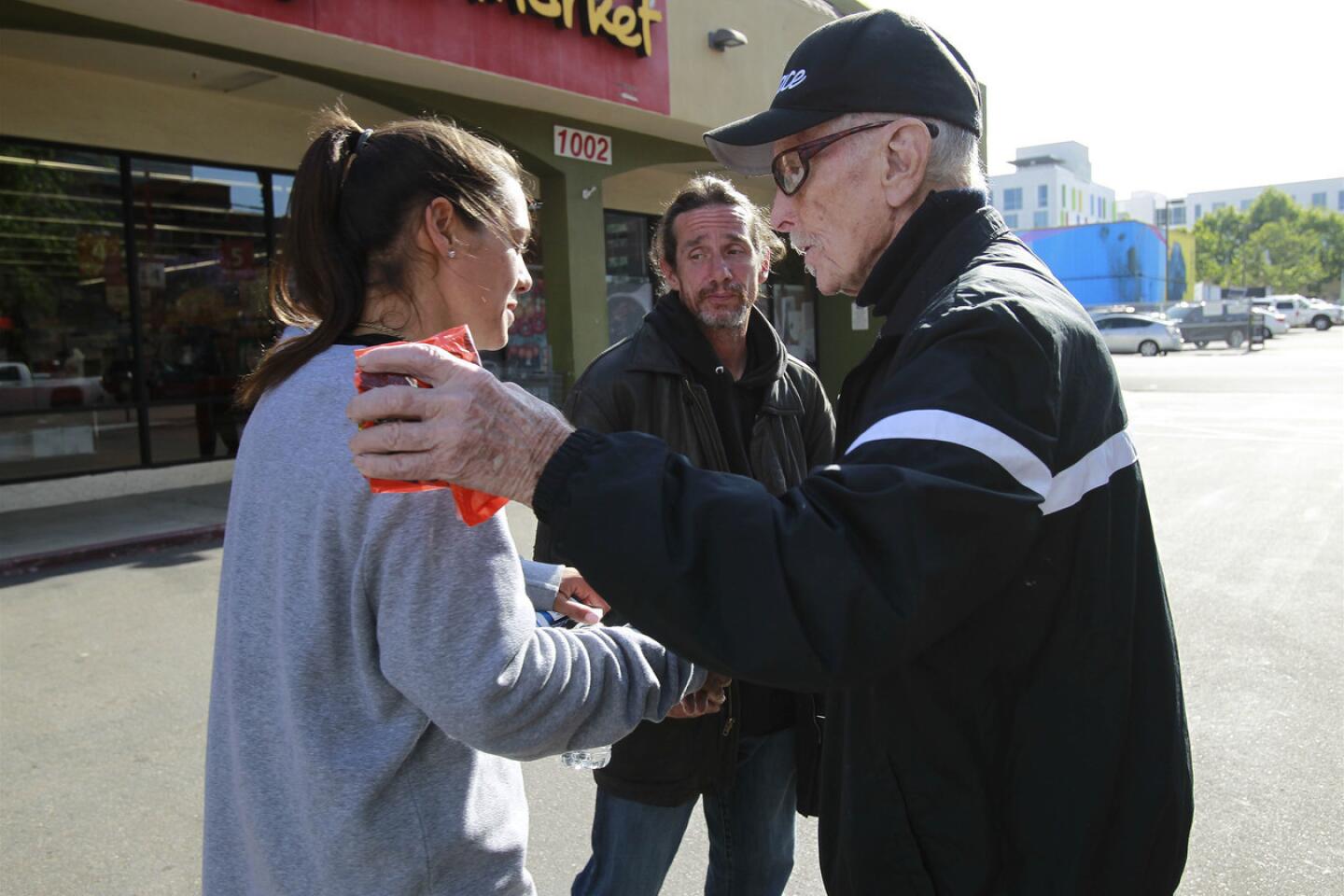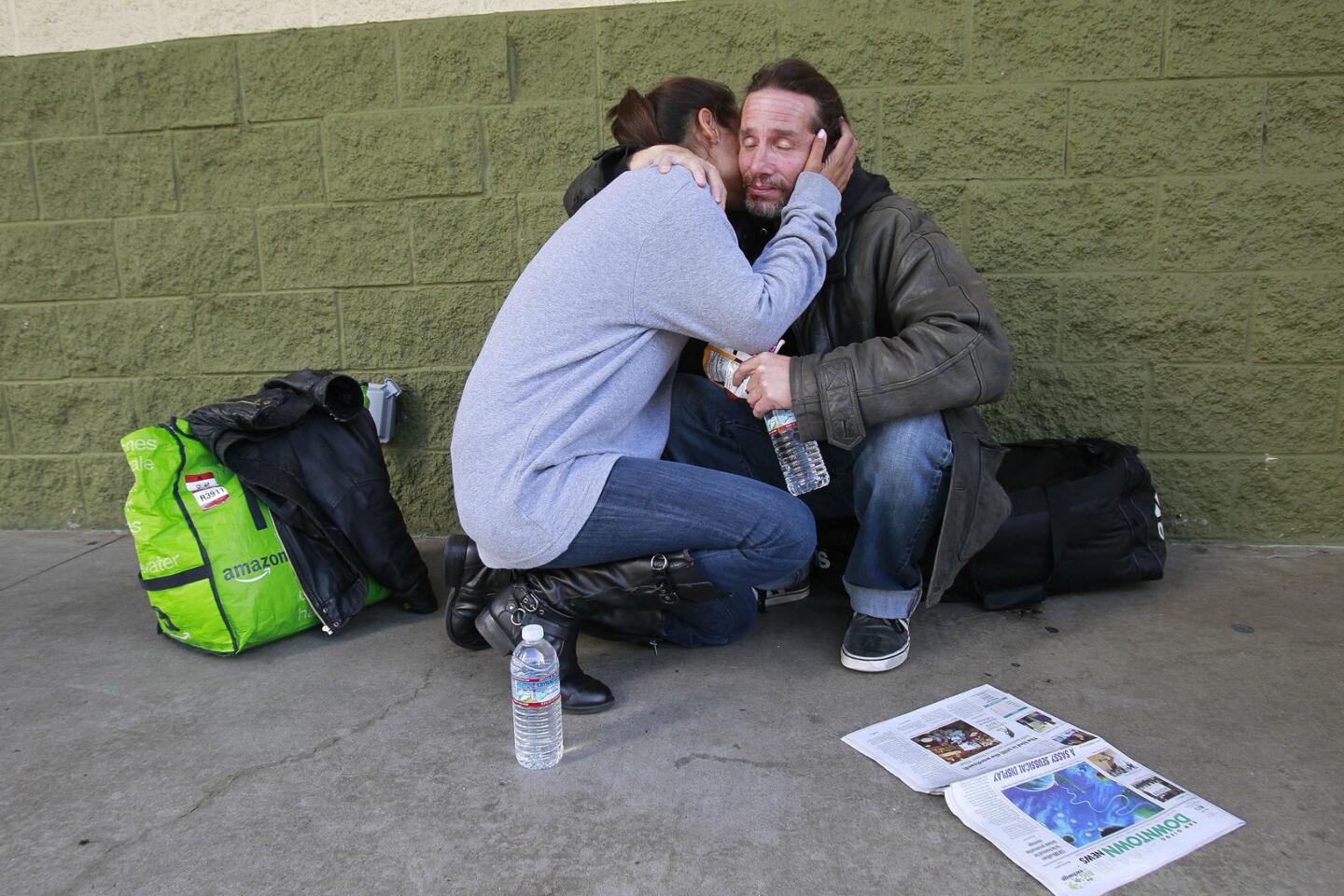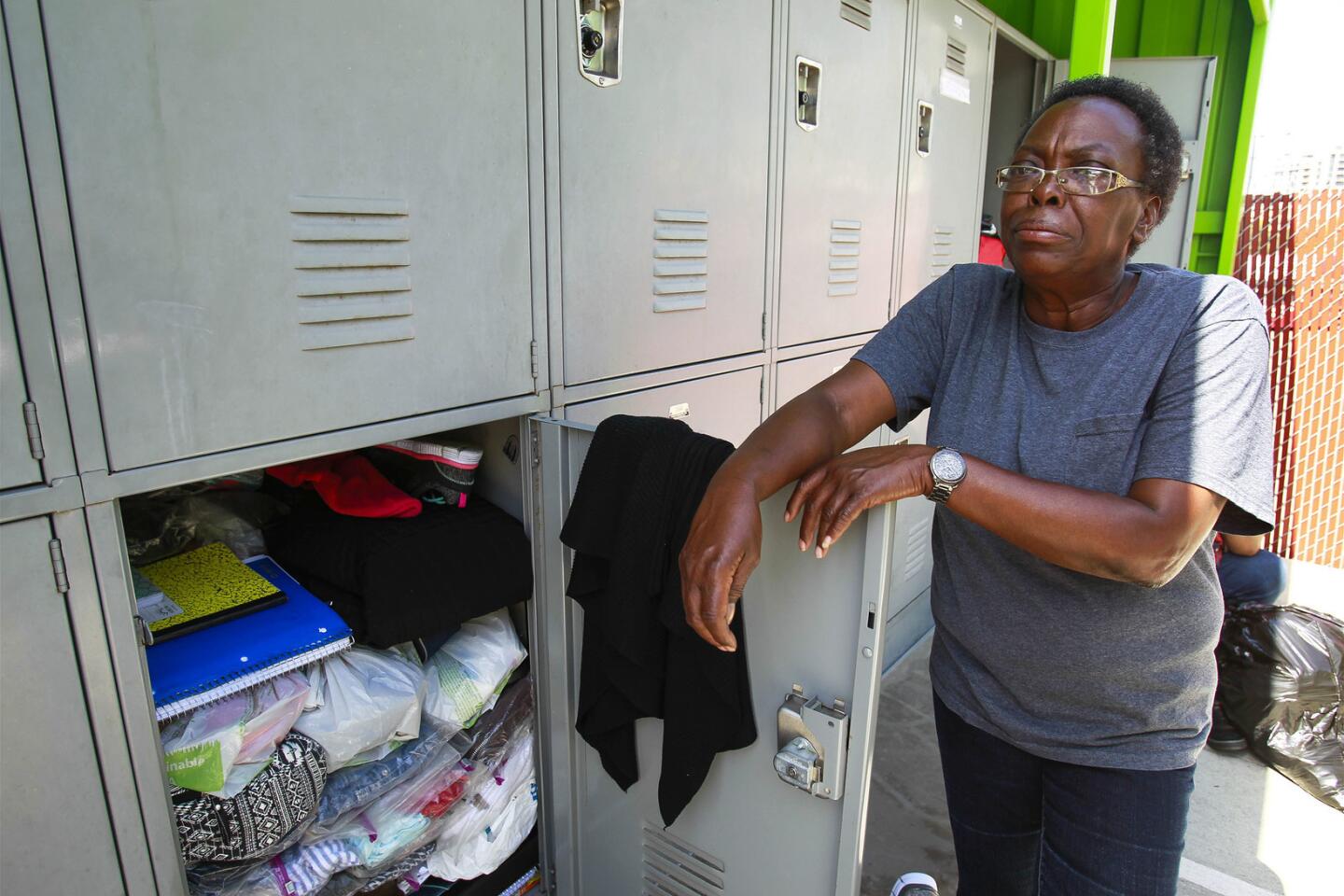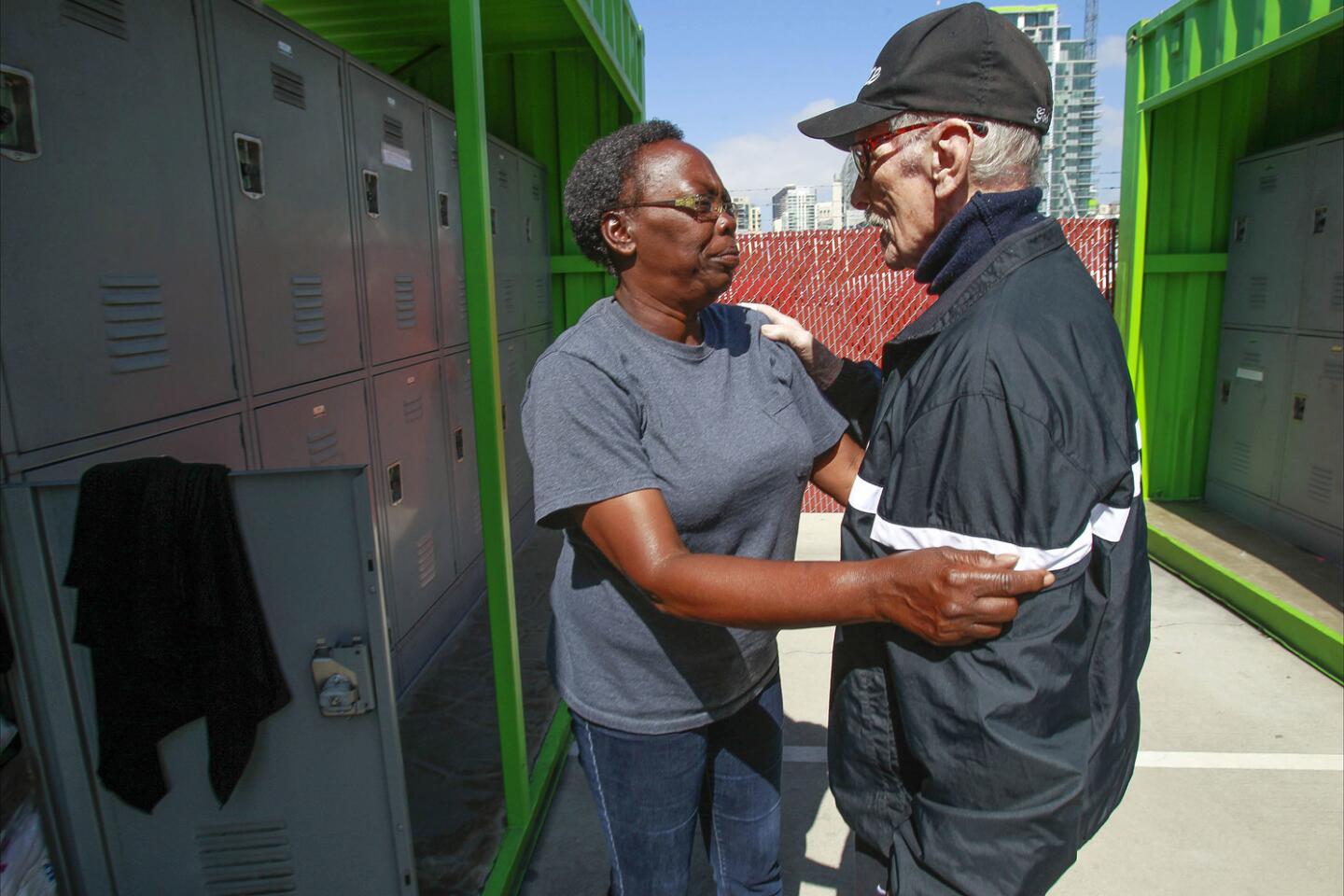Column: In poverty himself, ‘Water Man’ is fearless saint of San Diego’s homeless
- Share via
About 18 years ago, David Ross was driving home from his volunteer job at St. Vincent de Paul’s homeless assistance complex.
It was raining and cold in downtown San Diego. Under a bridge, a woman was shivering. She was maybe 60, small and vulnerable. Ross rolled down his window and offered her a blanket, naturally assuming the cold was her biggest problem that night.
She declined, asking instead for water.
After some polite back and forth, she drank the leftover half of his bottle of water. Ross remembers that her countenance immediately brightened. It was like some life force went from that clear, plastic bottle directly into the woman’s body.
“Then it dawned on me,” Ross told me recently. “These people are thirsty. Can you imagine a need any more basic than water? There’s no water fountains down here. My God, they need water.”
So Ross drove to a nearby store and returned with a case of water. Homeless people mobbed his car until the bottles were gone. That’s how Ross became the “Water Man,” a retired car salesman who was transformed by circumstances and compassion into San Diego’s version of Mother Teresa.
I invoke this comparison, to the 20th Century saint of India’s slums, advisedly.
For openers, San Diego is fast becoming America’s Calcutta, with large tracts given over to squalor and suffering.
Homeless deaths doubled to 117 last year. A federally mandated count in January found 5,621 people living outdoors across the county, a 68 percent increase since 2007.
More serious was the 148 percent surge, to 1,750, in “unsheltered chronically homeless individuals,” who by definition were disabled and living outdoors for a year or more — society’s most vulnerable people.
Then there’s Ross, who at age 83, subsisting on Social Security and nearly as poor as the homeless, has waded into San Diego’s sea of misery every day for nearly two decades to help “his people.”
Well, not every day. There have been hospital stays, the result of multiple saint-related injuries.
Ross has been punched in the mouth and lost teeth. A psychotic plunged a screwdriver into his neck. He was shot in the leg, by a ricochet off the pavement as he tried to get distance from two combatants. The most serious, the wound that nearly killed the Water Man, was an abdominal stabbing from a box cutter.
There’s also an emotional toll.
“Do I worry about Dave? Yes,” said Anne Rios, the executive director of Think Dignity, a nonprofit that endorses his focus on basic needs. “He is in contact with those who are hurting every day, and he absorbs that.”
Yet back into dystopia Ross goes, nearly every day, armed with little more than bottles of water, maybe some chips, and relentless compassion. To him, these people deserve love, not revulsion or punishment.
“It’s not my job to judge,” Ross said on a recent outing. “It’s just to help them what little I can.”
Between federal, state and local funding, San Diego’s city and county governments spend about $400 million each year on the poor, funding everything from housing to job training to substance abuse treatment. Combined with nonprofits, this equates to thousands of people trying to prevent or cure homelessness. Some certainly work just for the paychecks, but I choose to believe that most toil because they truly want to help people.
In this material context, Ross’s efforts are comparatively minor, even trivial. Yet his spiritual contribution is considerable.
Conditions were grim by the middle of last month in San Diego’s East Village, as they are most months after the welfare checks have been spent.
Ross was loading water and chips from the Grocery Outlet Bargain Market into his old Ford when he spotted a young couple sitting in the shade among a few scattered possessions.
Newly homeless, Katarina Boudreau and Gary Arnold had traveled from Los Angeles to clear up a ticket as a condition of Boudreau’s probation. After their initial wariness yielded to friendly conversation, Ross handed them some water and candy along with advice about potential shelter openings, noting that most programs won’t accept couples, or those who aren’t mentally ill or actively using alcohol or other drugs.
“God bless you guys for staying together,” Ross said, his eyes welling up as he hugged them both. Driving to his next stop, he noted that an attractive young homeless woman didn’t stand much chance downtown without a man willing to protect her from the predators who house such girls in motel rooms as forced sex workers.
At the next stop, Ross delivered water and a hug to Darrell, who said he was diagnosed as a paranoid schizophrenic in 2008. He’s been homeless, off and on, for about the last five years.
“I get scared and run away from home,” Darrell explained.
Sinead Law, homeless for a year and half, had celebrated her birthday in a tent the previous Friday.
“My friend Candy, she was pregnant, hung herself that day” from an adjacent fence, said Law, who saw her and summoned help from nearby homeless people. Mother and baby survived, she reported with a mirthless smile.
Jia Lawton, wearing a tidy flowered shirt, grabbed hold of Ross and sobbed into his shoulder. After 18 months of sobriety, she had relapsed into a longstanding addiction to alcohol and weed.
“There’s just so many times I can throw myself through a program,” Lawton said.
Now she was immobile with hopelessness, and frightened. Criminals were stealing everything, including her asthma inhalers. Homeless were getting beaten up.
Ross was right there with these storytellers, riding a tide of empathy. Sometimes he was cracking people up, clowning and doing an Ali shuffle along with patter about his childhood in a Detroit Golden Gloves boxing program. Other times he was choking back tears of outrage.
Like advocates for the poor throughout history, Ross has a tendency to afflict the comfortable.
In 2009 he sued the city of San Diego, represented by attorney Scott Dreher and joined by the American Civil Liberties Union. Police and city workers had been slashing tents and crushing the worldly possessions of the homeless in garbage trucks.
The resulting settlement put a federal judge as overseer of San Diego’s enforcement policy, with conditions that draw frequent complaints from property owners. The homeless must have 72 hours notice before their stuff can be tossed. Vagrancy laws can’t be strictly enforced as long as the city fails to provide sufficient housing.
Another result is the Water Man’s proudest achievement, a city-owned lot that holds 304 secure lockers and 96 bins so that 400 homeless people can keep their possessions. There’s a waiting list, but nobody will toss possessions as long as clients can manage to check in once a week.
For those capable of pulling their lives back together, secure storage is essential, and can enable amazing results. Since 2013, the operation has helped 100 people move from the street into permanent housing and/or employment.
“We got one guy who graduated college from a sidewalk,” said Danny McRay, who has supervised the storage lot since its inception.
The lot is funded with just $120,000 a year from city government and private sources. It’s operated by Think Dignity, formerly known as Girls Think Tank, the nonprofit Rios now runs that was founded in 2006 by professional women in San Diego, most of them attorneys.
The nonprofit also helps Ross directly, adding $240 a month to a debit card that he uses to buy his water. That’s pretty much it; $240 from his “lawyer girls,” the occasional donation, and what’s left over from a Social Security retirement after rent, food and gasoline.
Ross has scored other successes over the years, along with setbacks. He and Think Dignity got six portable toilets installed downtown, but San Diego removed them. Now there’s just three public toilets open 24 hours a day in the entire downtown area.
If water and toilets seem like small matters, you’ve never been homeless. And Ross frequently reminds public officials that such deficits are evidence of serious moral failing.
To see how such feedback is welcomed, I suggest watching the video on the city’s website of the Dec. 5 meeting of the San Diego City Council, starting at about 44 minutes into the recording. Spoiler alert: At a session dedicated to how the city should allocate federal homeless funding, former Council President Sherri Lightner cut off the microphone while Ross was speaking during a public comment period, ruling that his comments were not germane to the topic.
She also refused to hear from Robert Coates, a former judge and expert on homeless policy who helped found a mayor’s taskforce on homelessness. No council member objected to this exhibition of official disrespect, although the men were invited to wait four hours to comment at the end of the meeting.
Ross goes to lots of city council meetings. There’s only so much reminding a room full of politicians can tolerate.
Yet Ross seems unlikely to stop trying to help people, regardless of official resistance or personal discomfort.
On a previous tour of the area, a social worker advised me to avoid touching the dirty and deranged because of a recent outbreak of hepatitis A, a potentially fatal viral infection that destroys the liver. Poor sanitation — specifically the presence of human feces on unclean hands and clothing — vastly aids its spread.
Ross knew about the outbreak, of course, which has killed three people and hospitalized at least 66 more. I asked if he was being more careful.
“I touch everybody,” the Water Man said. “They need the hugs. They need to know I care about them.”
Previous columns in this series:
As government saunters, homeless crisis accelerates (April 23, 2017)
Homeless crisis is solvable, but won’t yield to political timidity (Jan. 29, 2017)
Homeless for the holiday, yet joy flickers (Dec. 25, 2016)
In the agony of childbirth, a homeless woman finds help (Nov. 27, 2016)
In failing the homeless, San Diego stands apart (Oct. 31, 2016)
Leniency has been hard on homeless (Sept. 18, 2016)
Great weather can’t explain away San Diego homeless crisis (Sept. 4, 2016)
Street population soars after SD ups homeless spending (Aug. 21, 2016)
Back story: San Diego’s homeless problem soars (Aug. 21, 2016)
Business
dan.mcswain@sduniontribune.com (619) 293-1280 ▪Twitter: @McSwainUT
More to Read
Inside the business of entertainment
The Wide Shot brings you news, analysis and insights on everything from streaming wars to production — and what it all means for the future.
You may occasionally receive promotional content from the Los Angeles Times.
